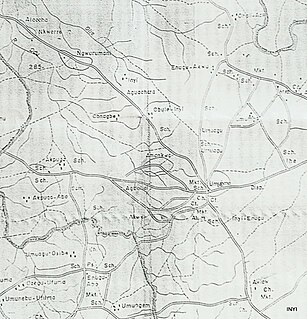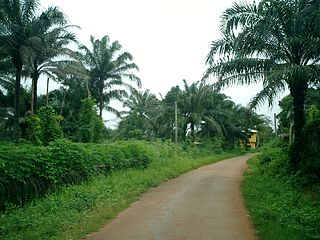
Nnewi is a commercial and industrial city in Anambra State, southeastern Nigeria. It is the second largest and second most populous city in the southern part of the country. Nnewi as a metropolis has one local government area, which is Nnewi North. Nnewi North comprises four quarters: Otolo, Uruagu, Umudim, and Nnewichi. The first indigenous car manufacturing plant in Nigeria is located in the city while the first wholly Made-in-Nigeria motorcycle, the 'NASENI M1' was manufactured in Nnewi.
Arondizuogu (Aro-ndizuogu) is a town inhabited by the Igbo subgroup, the Aro people in the Imo State of Nigeria. The Arondizuogu community is believed to have migrated from Arochukwu in the present Abia State, to their current settlements in across three local governments of Imo state, which include the Okigwe, Ideato North and Onuimo Local Governments, although there are others of Aro descent in other local governments, in Imo State.
Onicha Nwe-Nkwo is an autonomous community in Ezinihitte Local Government Area, Mbaise, Imo State, Nigeria.
Azaraegbelu is a village in southeastern Nigeria located near the city of Owerri. The name has its origin in Emekuku. Azaraegbelu was the first son of Emekuku and was regarded as the most powerful.
Ejemekwuru is an Igbo-speaking community that sits in the North-Western part of Imo State in the southeastern region of Nigeria.
Umundugba is a town in Isu Local Government Area of Imo State, Nigeria, and is the headquarters of Isu LGA.
Umunze is the headquarters of Orumba south local government area in Anambra state of Nigeria. Its geographic coordinates are 5° 58′ 0″ north, 7° 13′ 0″ east.

The Kingdom of Nri was a medieval polity located in what is now Nigeria. The kingdom existed as a sphere of religious and political influence over a third of Igboland, and was administered by a priest-king called an Eze Nri. The Eze Nri managed trade and diplomacy on behalf of the Nri people, a subgroup of the Igbo-speaking people, and possessed divine authority in religious matters.
Nnarambia is a town in Ahiara, Imo state, Nigeria. It is made up of five hamlets: Ama-obu, Amakpaka, Umuezereugwu, Umunnachi, and Ofor na Obia.
Igbo Culture are the customs, practices and traditions of the Igbo people of southeastern Nigeria. It consists of ancient practices as well as new concepts added into the Igbo culture either by cultural evolution or by outside influence. These customs and traditions include the Igbo people's visual art, music and dance forms, as well as their attire, cuisine and language dialects. Because of their various subgroups, the variety of their culture is heightened further.
Okpofe is an autonomous community located in Ezinihitte Mbaise local government area (LGA), in Imo State, Nigeria with common boundaries with Itu, Ezeagbogu, Ihitte, Amumara and Oboama autonomous communities. Okpofe is the centre of the Ezinihitte Mbaise clan, and it is the only town in Ezinihitte Mbaise that does not share a boundary with another local government area in Imo State. It is quite a unique town in Ezinihitte. It is also on record that the Roman Catholic Church was first established in Okpofe town in the year 1918 when the first crop of missionaries brought to the town held the first Catholic mass at the shrine of Inyama Oguegbe Ajero, who himself was the Second Paramount King of the ancient town after Chief Mbagwu. Ezinihitte Mbaise The Anglican Juniorate in Mbaise is located in Okpofe too.
Ihiagwa is a town in Owerri West Local Government Area of Imo State, Nigeria. It is located 12 km (7.5 mi) south of the capital city of Owerri. The township is composed of eight villages: Umuelem, Umuchima, Mboke, Nnkaramochie, Iriamogu, Aku/Umuokwo, Ibuzo and Umuezeawula. Ihiagwa has been divided into two autonomous communities, namely native Ihiagwa (Chimelem), comprising two villages: Umuelem and Umuchima—and Dindi Ihiagwa, comprising the remaining six villages, all divisions done for administrative and developmental reasons. Each autonomous community is a monarchy ruled by an Eze.
Ogba–Egbema–Ndoni is a Local Government Area of Rivers State, Nigeria under Rivers West Senatorial District, with its capital at Omoku. With about 258,700 People according to 2006 Census, It is bounded by Imo, Delta, Bayelsa, Abia and Anambra states and also by Ahoada West, Ahoada East and Emohua Local Government Areas of Rivers State. They are part of the Igbo speaking Areas of Rivers State with three Tribes starting with Ogba as the dominant tribe with 12 legislative wards and the Egbema and Ndoni Tribes with 2&3 legislative wards respectively. It is majorly upland and home to the highest upstream Oil and Gas exploration/exploitation activity in the State since early 1960's with about 12 mining/producing fields operated by AGIP, Total and Shell/NPDC with many other reserve/untapped fields. It is part of the Ogba / Egbema / Ndoni / Ahoada West constituency of the Nigerian House of Representatives. Hon. Vincent Job is the Executive Chairman of ONELGA
The Umuoji people are those whose roots can be traced to the town of Umuoji, in Idemili North - a local government area in Anambra State, Nigeria. These people are an Igbo speaking ethnic group, whose early history is adversely affected by a lack of, or non-existent, written records. Umuoji is bounded by Ogidi, Ojoto, Uke, Abatete and Nkpor and has an estimated population of 80,000 people which includes local residents in its 23 villages and citizens in diaspora.

Ishiobiukwu Gedegwum is the ancient palace of the Orlu people. This is the residence of the traditional monarchy of Orlu, known as the Igwe of Orlu in Nigeria. Located in Imo state, the palace is often at the centre of state occasions and royal hospitality. It has always been a focal point for traditional festivals, ceremonies and dispute resolution.

Inyi is a town in Enugu State, Nigeria.
Amorka is a town in the Ihiala government area of Anambra State of Nigeria. It is located along the Onitsha-Owerri Expressway, on the border of Mgbidi Imo Statė. Amorka is a home to the former Biafran Airport stripes. Amorka is a home to a famous Bunker of Dim Chukwuemeka odumegwu Ojukwu during the Biafran war and still exists. The traditional ruler of the town is Chief Nze Keneth obiriolemgbe. Amorka can boast of many Elites. Engineer Mark Ezemba a very well known politician in Anambra state and Nigeria. Hon Chidi Udemadu representing Ihiala constituency, Barrister Chinweuba Ndukaihe, Barrister Lawrence Nwaketi, Barister SUS Mbanaso, Chief Nze Dr Philip Chuddy Ogwo, Chief Cally's Obiagazie, Mr Chinedu Ezidiegwu, Chief Nze Victor Ezemba, Mr Ebere Igbokwuputa, Prof Simeon Alozieuwa, Chief Nze Benson Ogwo (Akuamia1), Prince Louis obiriolemgbe, Chief Michael Ezemba Egbedike, Hon Chidiebere Chidon (Dontels), Hon Enyebros Ogwo, Nze Chidozie Ezidiegwu, and numerous others. Amorka has 10 villages.
Igwe Orizu I was the 18th Obi of Otolo and the Igwe of Nnewi kingdom. He was the traditional supreme ruler and spiritual leader in Nnewi, an Igbo city in Eastern Nigeria. Eze Ugbonyamba was crowned the King of Nnewi and he took the ofo of Nnewi after his father's death in 1904. He was a member of the Nnofo Royal lineage and the successor to his father Igwe Iwuchukwu Ezeifekaibeya. Igwe Orizu I died in 1924 and was succeeded by his first son Igwe Josiah Orizu II. One of remarkable events of his reign was the arrival of the British in 1905.

Awka-Etiti, historically known as Awka-Diedo ; later mentioned as Awka-Nkakwu (Okankaku) by colonial authors, is an affluent town comprising seven villages in Idemili South local government area of Anambra state, Nigeria. The seven villages of Awka-Etiti in order of age established are: Nkolofia, Umunocha, Ejighinandu, Iruowelle, Umudunu, Nnaba and Ogunzele.
Nawfia is a town in Njikoka Local Government Area of Anambra State, Nigeria. Nawfia is surrounded by neighbouring towns namely Enugwu Ukwu, Awka (Umuokpu), Nise, Amawbia and Enugwu Agidi. It is predominantly occupied by the Igbo ethnic group and is believed to be one of the towns that make up the ancestral home of Igbo people. Most of its inhabitants are Traditionalists and Christians. Igbo, English and Pigeon-English are the predominant languages spoken in Nawfia.




